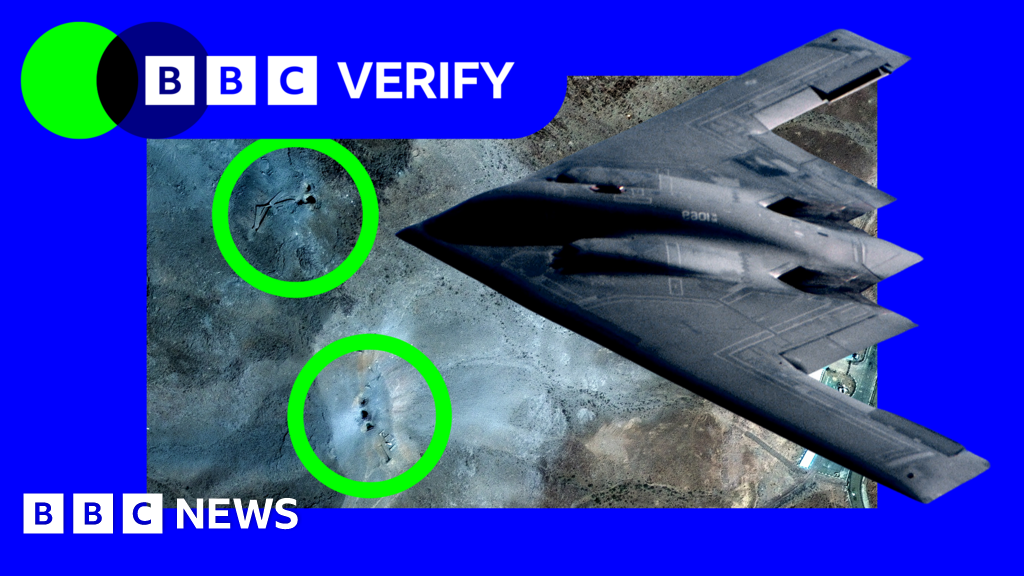It took months of planning and included over 125 planes, a submarine and 14 "bunker buster" bombs. BBC Verify's Merlyn Thomas describes how the US mission "Operation Midnight Hammer" took place and analyses new satellite imagery that reveals the damage at Iran's nuclear sites Isfahan, Natanz and Fordo. Produced by Aisha Sembhi. Graphics by Mesut Ersoz. Israel's prime minister said Iran's nuclear capability posed a "clear and present danger", while Iran's president promised a "powerful" response. The BBC's Hugo Bachega reports from Jerusalem, after Israel launched overnight strikes against sites across Iran. Israeli Prime Minister Benjamin Netanyahu said in a video statement that Israel has launched Operation Rising Lion. Israel says it has carried out strikes on Iran's nuclear programme, with blasts and fires seen in Tehran and elsewhere. Palestinians can be seen climbing over fences and running to get humanitarian aid in the footage. The BBC heard from dozens of former officials about their role enforcing the brutality of the Assad regime. Onboard security footage from the Madleen aid vessel shows activists throwing their tech overboard and putting up their hands. Mirjana Spoljaric has appealed to world leaders to intervene in the conflict in Gaza. The BBC’s Anna Foster hosts a debate to discuss whether there have been war crimes in Israel and Gaza. The UN's Tom Fletcher tells the BBC the people of Gaza have been subjected to forced starvation by Israel. A Unifil spokesperson said the main violations of a ceasefire deal reached six months ago are from the Israeli side. Ward Jalal Al-Shaikh Khalil escaped the flames at the school, unaware her mother and two siblings had died in the strike. The BBC's Wyre Davies visits the Kerem Shalom crossing, through which aid for Gaza is currently passing after Israel eased an 11-week blockade. Witnesses tell the BBC about hearing gunshots and the shooter shouting: 'Free Palestine'. Israel says its reopened access for a limited number of aid trucks into Gaza, after blocking supplies from entering the territory for the last 11 weeks. BBC Verify has been looking into the latest strikes and aid situation in Gaza. Dr Rose has been describing life at Nassar Hospital in Gazan city of Khan Younis. About 14,000 babies will die in 48 hours if aid does not reach them, a UN humanitarian chief warns. The BBC's Analysis Editor Ros Atkins looks at how world leaders are responding to Israel's blockade of Gaza. Tuesday's strike killed 28 people, the Hamas-run civil defence said. Israel says it was a precise strike on Hamas. In the first major diplomatic trip during his second term, the president is hoping to secure significant new investment in the US in the four-day trip to Saudi Arabia, Qatar and UAE.
Satellite images and decoy planes: Behind the US attacks on Iran
TruthLens AI Suggested Headline:
"US and Israel Conduct Military Strikes on Iranian Nuclear Facilities Amid Rising Regional Tensions"
TruthLens AI Summary
The recent military operations conducted by the United States and Israel against Iranian nuclear facilities have been characterized by extensive planning and execution. Dubbed 'Operation Midnight Hammer', the US mission involved over 125 aircraft, a submarine, and the deployment of 14 bunker buster bombs. Satellite imagery analyzed by BBC Verify has revealed significant damage at critical sites, including Isfahan, Natanz, and Fordo, all of which are central to Iran's nuclear ambitions. Israeli Prime Minister Benjamin Netanyahu has publicly stated that Iran's nuclear capabilities represent a 'clear and present danger'. In his latest address, he announced the launch of 'Operation Rising Lion', underscoring Israel's commitment to targeting Iranian nuclear infrastructure. The strikes have resulted in visible explosions and fires across Tehran and other locations, further escalating tensions in the region. Iran's leadership has vowed to respond forcefully to these attacks, indicating a potential for increased conflict in the area.
In addition to the military actions against Iran, the situation in Gaza remains dire, with reports of humanitarian crises exacerbated by an Israeli blockade. Recent strikes in Gaza resulted in civilian casualties, with the Hamas-run civil defense reporting at least 28 deaths from a single attack. The UN has raised alarms about the humanitarian conditions in Gaza, warning that approximately 14,000 infants could perish within 48 hours if aid does not reach them. The blockade has restricted access to essential supplies, but Israel has recently allowed a limited number of aid trucks into Gaza after an 11-week hiatus. Amidst these developments, international leaders are being called upon to intervene, as the humanitarian situation continues to deteriorate. The complexities of the ongoing conflicts in both Iran and Gaza illustrate the fragile state of security and humanitarian conditions in the region, with world leaders closely monitoring the evolving situation.
TruthLens AI Analysis
You need to be a member to generate the AI analysis for this article.
Log In to Generate AnalysisNot a member yet? Register for free.
